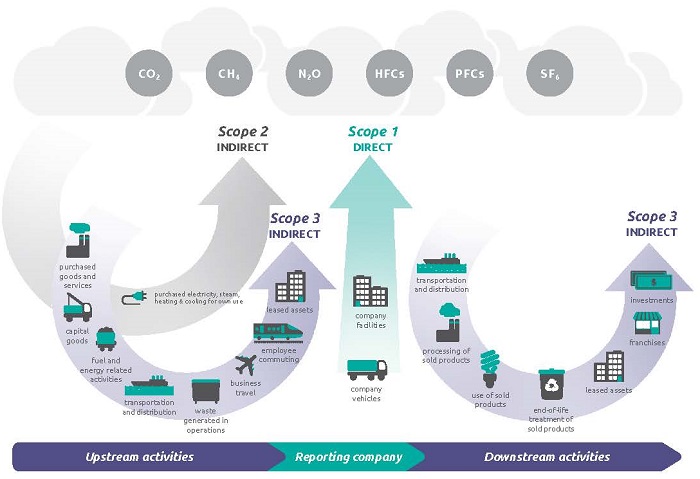
What are Scope 1, 2 and 3 emissions?
Scope 1: Direct emissions that result from activities within your organisation’s control. This might include onsite fuel combustion, manufacturing and process emissions, refrigerant losses or company vehicles.
Scope 2: Indirect emissions from electricity, heat or steam that you purchase and use. Although not directly in control of the emissions, by using the energy you are indirectly responsible for the release of CO2.
Scope 3: Any other indirect emissions from sources outside of your direct control. This category covers all the emissions associated, not with the company itself, but those for which the organisation is indirectly responsible up and down the value chain. This includes purchased goods and services, use of sold goods, business travel, commuting, waste disposal and water consumption.
The terms Scope 1, 2 and 3 emissions were created by the GHG Protocol in 2001, where their meaning is demonstrated in the following graphic:
Overview of GHG Protocol scopes and emissions across the value chain

Source: ghgprotocol.org
An environmental road map to transformation
Our environmental roadmap supports you at each stage of your transformation journey, whether you are starting from scratch or in the process of executing your strategy. This roadmap will help determine your scope 1, 2 and 3 emissions and what you need to report.
Benefits of a well-defined environmental strategy
- Reduces emissions and safeguards the business from rising carbon tax costs
- Reduces energy consumption and protects the business against energy price rises
- Supports alignment with regulations, compliance and aligns to international reporting standards (which includes disclosures around scope 1, 2 and 3 emissions)
- Reduces the negative impact of an organisation to the environment.
Commentary from Padraig Ryan, Partner - Consulting
"Measuring carbon emissions empowers companies to contribute positively to the global transition towards a low-carbon economy while safeguarding their long-term viability and reputation. By quantifying their carbon footprint, companies can accurately assess their environmental impact and identify areas where emissions reduction efforts are needed.
This data not only demonstrates a commitment to addressing climate change, but also helps enhance operational efficiency, mitigate risks and align with evolving consumer preferences for eco-conscious products and services. Furthermore, transparent carbon reporting can foster stakeholder trust, attract environmentally conscious investors and drive innovation toward cleaner, more resilient business models."
We can help
We hope you find the information in this article helpful in giving you an overview of GHG emissions. If you would like to discuss any of the points raised, please speak to your usual Grant Thornton contact.

